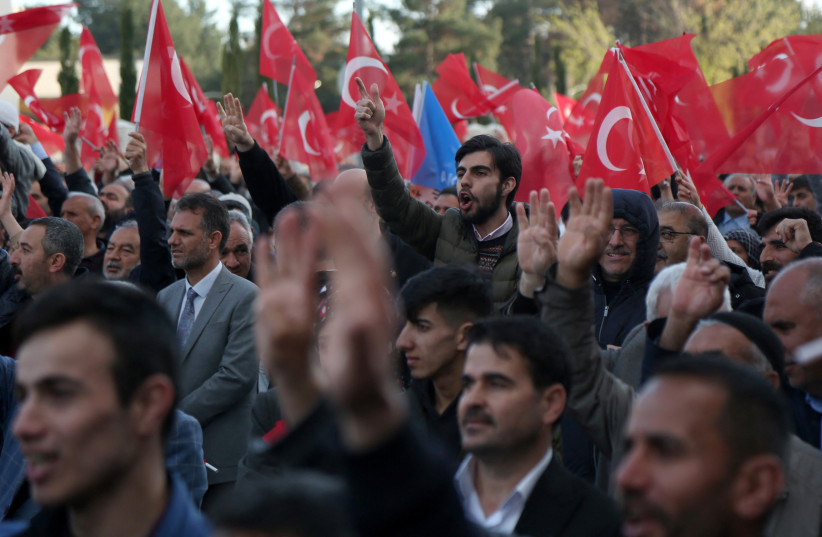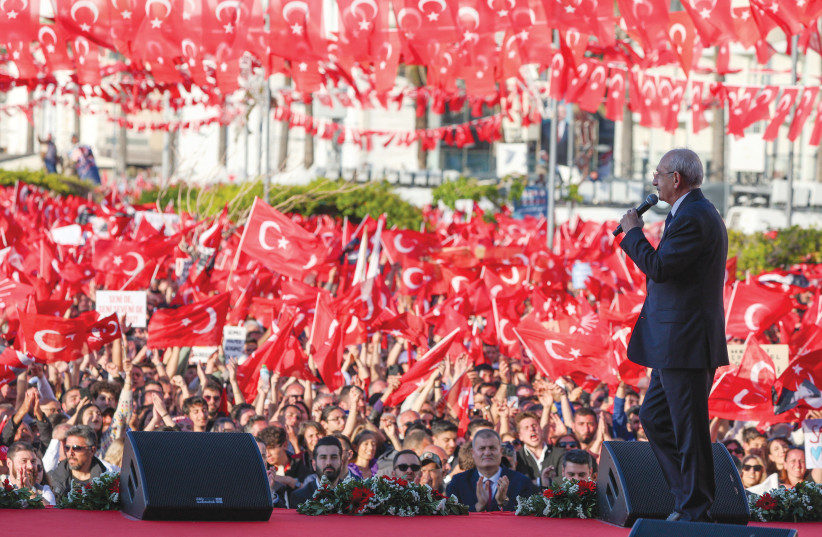Selahattin Demirtas has been the co-leader of the left-leaning Peoples’ Democratic Party (HDP) since 2014. In the wake of Turkish elections which saw the authoritarian president extend his rule into a third decade, the jailed opposition leader has announced his decision to leave politics.
It appears that the decision to “retire”, apparently not forced on him in prison, was taken in the wake of another lost election in Turkey. Even though the opposition united parties across the political spectrum, it could not unseat the AKP party and its long-time leader Recep Tayyip Erdogan. Many opposition politicians and critical journalists have been jailed in Turkey, meaning politics is far from free, and the story of Demirtas is symbolic of the story of modern Turkey.
A symbol of the story of modern Turkey
He was born in 1973 and studied at university, eventually becoming a lawyer. He also got involved in human rights activism. In the 1990s, the old days, Turkey was run by a secular nationalist Kemalist party. At the time human rights activists and lawyers were sometimes targeted by the state. Vedat Aydin, a Kurdish politician and human rights activist, for instance, was murdered in 1991 after police took him from his home and bundled him into a car.

Ankara has long claimed to be fighting “terrorism” and after 9/11 received backing from the West for its “war on terror,” but this is a conflict largely waged against civilians. Ankara claims some 40,000 have died in this “war on terror” but those numbers do not always reveal how many of the casualties were caused by the state, as opposed to “terror” attacks.
Turkey’s politics changed in 2002 when the AKP came to power, unseating the Kemalist CHP (Republican People’s Party) the oldest political party in Turkey which had ruled the country for most of its history. The AKP was led by Erdogan and was rooted in right-wing Islamic politics.
It came to power promising reforms. However, for Turkish minorities, particularly Kurds, it was unclear if the shift in power in Ankara would mean liberalization. Some believed it would and flocked to vote for the AKP. However the government continued to disband left-leaning parties that receive Kurdish votes, such as the DTP (Democratic Society Party) that the Supreme Court shut down in 2009, followed by the BDP (Peace and Democracy Party) in 2014.
Demirtas was a rising star in these parties. For the government these left-leaning parties were accused of being linked to “terrorists,” particularly the PKK (the Kurdish Workers’ Party).
In 2014 and 2015 elections Demirtas performed well and helped the HDP, his current party, get more than the 10% of the vote needed to enter parliament. In those years, a briefly peaceful era, the government and PKK observed a ceasefire. However tensions in Syria were boiling over and the ceasefire broke down in that context.
IT IS IMPORTANT to remember that in 2014 ISIS overran part of Syria and Iraq. ISIS also attacked Kurdish areas of Syria and Iraq. It laid siege to Kobani. Many Kurds joined the fight against ISIS, while other Kurds ended up as refugees in Turkey. Iraq, Syria, Iran and Turkey all have large Kurdish communities, totaling some 25 million. However, each country suppresses its Kurdish minority.
The fighting in Kobani unified the Kurdish community and support came from the autonomous Kurdistan Region of Iraq. However, the rise of the Kurdish YPG (The People’s Defense Units) in Syria, a self-defense unit that helped defeat ISIS in Kobani, led to tension in Turkey. The ruling AKP party had spent its first decade in power crushing the nationalist secular CHP opposition. It claimed to ferret out “coup” attempts by the army and began to go after opposition media. The ceasefire with the PKK gave it breathing room to do this. But the rise of the HDP in the June 2015 elections led to new elections in November 2015. The government began an offensive against Kurdish areas in Turkey, razing parts of cities and towns in a brutal war with the PKK.
It is possible that the PKK in Turkey was emboldened by the YPG’s success in Syria and believed that it could somehow stand up to the Turkish army in urban fighting. This choice proved disastrous. The AKP now turned its authoritarian tendencies toward destroying the PKK and the YPG in Syria.
The US meanwhile was gathering a coalition to defeat ISIS, and the US began working with the YPG, the most effective anti-ISIS fighting force in Syria. Russia had intervened in Syria also, and Turkey decided to begin operations across the border. Turkey’s opportunity came in 2016 when the SDF, (Syrian Democratic Forces), crossed the Euphrates river and liberated Manbij from ISIS. Ankara believed the SDF was going to defeat ISIS and reach Afrin, a small Kurdish mountainous area in northwest Syria. Turkey invaded Syria and began training former Syrian rebels to encourage them to fight Kurds, rather than fight the Assad regime.

Meanwhile, in Turkey the AKP was concentrating almost all political power in its hands. In July 2016 several army units appeared to launch a coup and Erdogan’s ruling party used this as an excuse to purge some 150,000 officials, claiming this huge number was linked to a coup attempt that involved a few thousand soldiers.
Thousands were jailed, including a US pastor, and Turkey claimed a conspiracy linking an Islamic group called FETO, the PKK and YPG.
This was obviously nonsense, but Ankara was able to pass new laws enabling almost total concentration of power in the hands of the government and removed parliamentary immunity from the opposition. In essence Ankara used the coup attempt, which it blamed on secular nationalists and FETO, to go after the left-leaning Kurdish parties. By 2017 Turkey had pushed a new referendum to create an all-powerful presidency.
DEMIRTAS WAS ARRESTED and jailed in November 2016 and the HDP has since seen many of its politicians jailed or forced into exile. The government often replaces and jails the mayors of any city that votes HDP. Because HDP members are brave the party continues to find new young people to stand for elections, virtually guaranteeing them life imprisonment.
Ankara’s struggle against the HDP has led it to invade parts of Syria and Iraq, claiming to be fighting the “PKK” and “YPG”. It invaded Afrin in 2018 and ethnically cleansed it of its Kurdish population, moving pro-AKP Arab rebels to settle in Kurdish areas. Then it enabled extremist members of HTS, (Ha’ayat Tahrir al-Sham) which was once linked to Al Qaeda, to take over part of Afrin.
Demirtas has retired from politics apparently realizing that after the May 2023 elections, even if the HDP partners with their old adversaries in the CHP, they will never unseat the forever leader in Ankara. “I choose to withdraw from active politics at this stage…I sincerely apologize for our failure to present a policy that meets the expectations of our people,” Demirtas said. “I send my greetings to all of you, my love, and I embrace you all with longing. Hope to see you in free days.”
During the run-up to Turkey’s elections last election most countries abroad did not critique the authoritarian ruling party because they believed the opposition had a chance at winning and didn’t want to give Erdogan a chance to use foreign statements against the opposition. But the opposition failed.
There has been an unprecedented outpouring of support by countries around the world for Erdogan after the elections. Congratulations poured in from other authoritarian regimes such as Iran and Russia; but also from Western countries. Many western countries sent notes that go beyond their support for fellow democracies.
Dutch Prime Minister Mark Rutte congratulated the Turkish president, saying he wishes Erdogan “every success in the years ahead,” Turkish media noted. “I look forward to continuing to strengthen Dutch-Turkish relations and working together as friends and allies,” he said on Twitter. Sweden, which Turkey has blocked from joining NATO and against which Ankara often incites, also ran to congratulate the ruler. France, which has been a victim of Ankara’s policies, did the same. German Chancellor Olaf Scholz congratulated Erdogan, saying: “Together we want to advance our common agenda with a fresh impetus!”
The statements made it clear that for the jailed opposition, their one-time friends in the West no longer have an interest in them. Back in 2016 the European Court of Human Rights had been interested in Demirtas’ case. Today there is silence. The story of Demirtas is symbolic of how minorities may try to participate in democracy and take up causes such as human rights and gender equality, issues the HDP pushed for, and be imprisoned on charges of “terrorism” without any pushback from other democracies.
